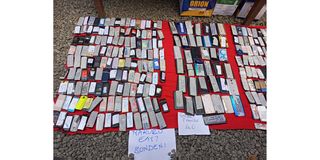Revealed: The origin of the dreaded 'Confirm gang'

Mobile phones recovered by the police during a crackdown on outlawed criminal gangs 'confirm' on June 28.
The chilling murder of six women in Mawanga area of Bahati constituency in Nakuru County has once again shone a spotlight on a criminal group that was outlawed by former Interior Cabinet Secretary Joseph Nkaissery in 2016.
The gang derives its name from the famous text message one gets when they receive cash on their mobile phone, “Confirm, you have received Ksh...”
This is because the gang targeted mobile phone users' cash by defrauding their victims via their M-Pesa, Equitel and Airtel Money accounts before morphing into an armed gang using crude weapons and guns.
A report funded by the Global Initiative Against Transnational Crime (GI-TOC) that helps build resilience in communities harmed or threatened by criminal gangs last year noted that the group started its operations in 2012 by conducting robberies in middle-class estates in Nakuru and slicing girls using razor blades before a majority of them were wiped out by security agencies and irate mobs.
Gang violence
“The remaining ones later regrouped and formed the Confirm Gang where they started conning people through mobile theft,” the report dedicated to victims of gang violence in Kivumbini, Bondeni, Mwariki, Kwa Rhonda and Mawanga notes, adding that the group’s prowess and expansion was aided by some former convicts.
The report states that the gang now operates M-Pesa shops which they use to conduct SIM card swapping by registering stolen and lost identity cards.
Members of Confirm gang mainly comprise unemployed youth living in the informal settlements and who are in search of a lavish lifestyle as depicted by their senior members.
New recruits are used to collect the identity cards or mug unsuspecting victims their phones, identity cards and other valuable items.
They also turn to women for transportation of their weapons and drugs like bhang, cocaine, hashish and jet fuel across their areas of operations.
The gang also uses women to spy on their behalf when a police vehicle is spotted in their vicinity.
Politicians weakest link
The report cites politicians as one of the weakest links against efforts to end the gang as they are the ones that bail them out from police cells when they are arrested, support which extends to hiring lawyers to assist them when prosecuted.
“Politicians are the greatest challenge when it comes to dealing with Confirm. They call the Officer Commanding Station (OCS) asking them what crime their ‘boys’ have done. They justify the crime saying the boys have used their brains to fend for themselves.
“Any leader who hides and protects this gang does not deserve to be elected as one,” Mr Francis Shinyalu, a community leader, says in the report.
The relationship between the gang and politicians is symbiotic in that while they use the gangs to frustrate opponents during rallies and incite the community, the gangs rely on politicians for protection and to bail them out thus making their networks more resilient.
Local police officers have also been accused of tipping the gang whenever a raid is planned.
Electioneering periods
An increase in cases of robbery with violence and murders across major towns in the country have ignited the debate on whether criminal gangs have mushroomed as they usually do during electioneering periods.
While this is happening, the government has not gazetted a new list of outlawed criminal gangs operating in the country in the past five years.
In 2002, President Daniel arap Moi banned 18 gangs, an act that was replicated by his successor, Mzee Mwai Kibaki, who in 2010 outlawed 33 gangs.
The highest number of gangs (90) were, however, banned by President Uhuru Kenyatta in 2016.
In 2017, the National Crime and Research Centre published a report showing there were 326 gangs in the country, a trend that shows the rapid nature at which gangs morph and spread.





